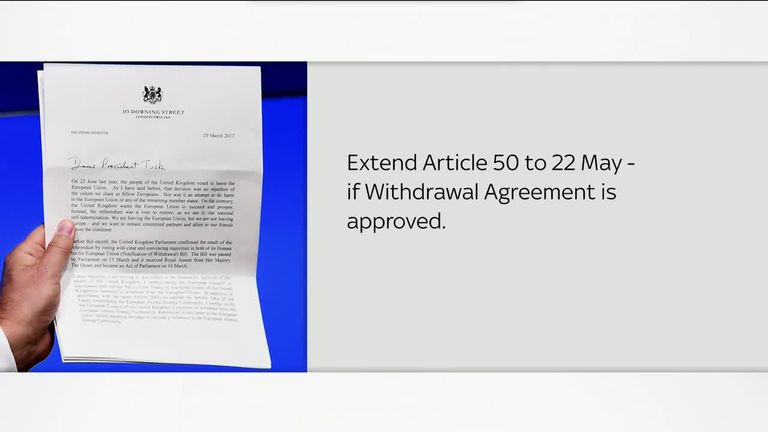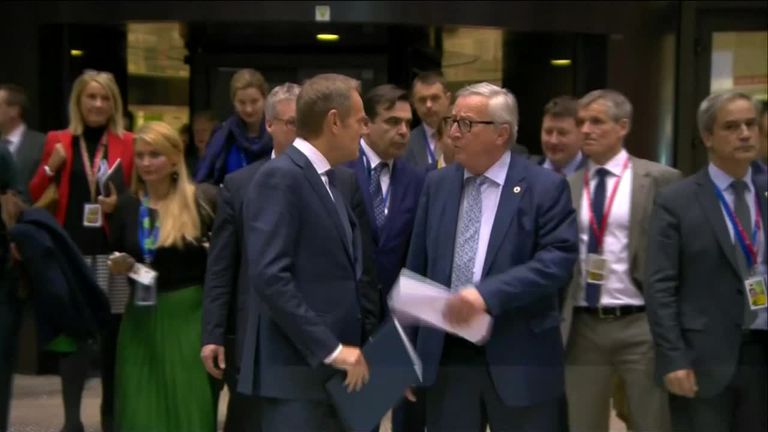Plan for MPs to get votes on seven Brexit options if Theresa May's deal defeated again
Downing Street considers giving the Commons a choice between various Brexit alternatives amid fears the PM's deal won't pass.
Saturday 23 March 2019 05:17, UK
Number 10 is understood to be considering allowing parliament to vote on seven alternative options next week amid growing fears that Theresa May will not get her Brexit plan through the House of Commons.
A senior minister in the government told Sky News that plans are being drawn up to give MPs a choice between revoking Article 50, a second referendum, the prime minister's deal, her deal plus a customs union, the deal plus a customs union and single market access, a standard free-trade agreement, or a no-deal Brexit.
Another source confirmed to Sky News that senior figures within government had been speaking openly about getting behind the idea.
The source said that it was being considered as a "way to find a solution", given that it now looks likely that Mrs May's Brexit deal will be defeated for a third time next week.
The minister said Number 10 is in "panic mode" and fears Mrs May's deal will not win enough support to pass the Commons.
They are understood to be weighing up the series of indicative votes in the knowledge that, if they do not allow MPs the chance to explore alternatives, parliament could force the government to allow such votes anyway by taking control of the Brexit process.
The votes would not replace a so-called "meaningful vote" on the prime minister's deal, which has to be held next week in order to meet the terms of the extension offered to the UK by the EU.
Asked about the plan for indicative votes, a Downing Street source said the prime minister was bound by commitments made in the House of Commons.
David Lidington, Mrs May's de facto deputy, told MPs last week that they would have further chances to express their views on Brexit in the coming weeks.
After leaving talks with Mr Lidington at the Cabinet Office on Friday, Liberal Democrat leader Sir Vince Cable said they'd had "a very good business-like discussion".
He added: "We're considering how parliament can consider a very wide range of options - including revocation, including a people's vote.
"The fact we're trying to find a way through this is encouraging."
Earlier, Brexit minister Kwasi Kwarteng suggested Conservative MPs would not be ordered to vote for any particular Brexit option if indicative votes were held.
He told MPs: "If the House is being asked to decide a way forward, it would be surprising if those votes were not free votes."
This sparked anger from Tory Brexiteers with Mark Francois, the vice-chairman of the European Research Group (ERG) of Conservative eurosceptics, telling Sky News: "If the government is going to allow unwhipped votes on indicative votes, if there is no government position on any of those issues about the future of our country, then there isn't really a government."
Former Brexit minister Steve Baker, a fellow member of the ERG, posted on Twitter: "National humiliation is imminent through these 'indicative votes'.
"The wrong Conservatives have the levers of power."
Another Tory Brexiteer, Marcus Fysh, branded the proposal "the most ludicrous, childish and unrealistic idea I have ever seen", adding: "Utterly unfit."
Former Tory minister Nick Boles, who wants the UK to pursue a Norway-style relationship with the EU, called for MPs to be put in charge of defining the different options put to indicative votes.
Labour has tabled an amendment calling on the government to provide enough time next week for MPs to be given votes on Brexit alternatives.
Jeremy Corbyn said: "Following a series of meetings with MPs from all parties, EU leaders, businesses and trade unions, I am convinced that a sensible alternative deal can be agreed by Parliament, be negotiated with the EU and bring the public together, whether they voted leave or remain.
"It's time for Parliament to take control of the Brexit process from this failed prime minister, and end the chaos and confusion created by the Government's divisions and incompetence."
In a sign of the task on Mrs May's hands to win over opponents of her deal, the Democratic Unionist Party said the PM "putting the blame on others cannot disguise the responsibility her government bears for the current debacle".
The Northern Irish party, whose support is key to a deal getting through Parliament, accused the government of being "far too willing to capitulate" to the EU.
Deputy leader Nigel Dodds said: "The prime minister missed an opportunity at the EU Council to put forward proposals which could have improved the prospects of an acceptable Withdrawal Agreement and help unite the country.
"That failure is all the more disappointing and inexcusable given the clear divisions and arguments which became evident amongst EU member states when faced with outcomes they don't like."








